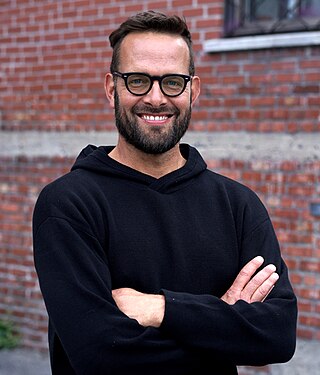Claude Jutra was a Canadian actor, film director, and screenwriter.

The history of cinema in Quebec started on June 27, 1896 when the Frenchman Louis Minier inaugurated the first movie projection in North America in a Montreal theatre room. However, it would have to wait until the 1960s before a genuine Quebec cinema industry would emerge. Approximately 620 feature-length films have been produced, or partially produced by the Quebec film industry since 1943.
The Prix Iris is a Canadian film award, presented annually by Québec Cinéma, which recognizes talent and achievement in the mainly francophone feature film industry in Quebec. Until 2016, it was known as the Jutra Award in memory of influential Quebec film director Claude Jutra, but Jutra's name was withdrawn from the awards following the publication of Yves Lever's biography of Jutra, which alleged that he had sexually abused children.
Léa Pool C.M. is a Swiss-Canadian filmmaker who taught film at the Université du Québec à Montréal. She has directed several documentaries and feature films, many of which have won significant awards including the Prize of the Ecumenical Jury, and she was the first woman to win the prize for Best Film at the Quebec Cinema Awards. Pool's films often opposed stereotypes and refused to focus on heterosexual relations, preferring individuality.

Benoît Charest is a Canadian guitarist and film score composer from Quebec. He is best known for the soundtrack of the animated film The Triplets of Belleville (2003), for which he won a César Award for Best Music Written for a Film as well as a Los Angeles Film Critics Association Award for Best Music. The song "Belleville Rendez-vous", in particular, earned him an Academy Award nomination as well as a Grammy Award nomination.

Elisapie Isaac is a Canadian Inuk musician, broadcaster, documentary filmmaker, and activist. She spent her childhood in Salluit, Nunavik, Quebec, and moved to Montreal in 1999 to pursue communication studies in order to become a journalist.
The Rendez-vous Québec Cinéma is a festival created in 1982 to celebrate the cinematographic production of Quebec, Canada.
The Great Resistance is a 2007 documentary film by Quebec film director Denys Desjardins. This length feature is produced by the National Film Board of Canada (NFB).
Luc Bourdon is a Canadian documentary filmmaker and video artist from Quebec known for his 2008 film The Memories of Angels. His other films have included La Grande Bibliothèque (2005), Classes de Maîtres (2009) and Une vie pour deux (2013).

François Delisle is a Canadian film director, screenwriter, producer, cinematographer, editor, actor, and composer.
Brigitte Poupart is a Canadian actress and filmmaker. She is most noted for her performance in the film Ravenous and for directing the 2012 film Over My Dead Body.
The Prix Luc-Perreault, formerly known as the Prix L.-E.-Ouimet-Molson, is an annual Canadian film award, presented by the Association québécoise des critiques de cinéma to a film deemed to be the best film of the year from Quebec, from among the films screening at that year's Rendez-vous Québec Cinéma.
Stereotypes is a Canadian fantasy short film, directed by Jean-Marc Vallée and released in 1991. The film centres on a woman who turns into a monster, and plunges her husband into a surreal alternate world, after he cheats on her.

Over My Dead Body is a Canadian documentary film, directed by Brigitte Poupart and released in 2012. The film is a portrait of Dave St-Pierre, a dancer and choreographer from Montreal who is urgently awaiting a lung transplant due to his lifelong battle with cystic fibrosis.
The Measure of Your Passage is a Canadian documentary film, directed by Esther Valiquette and released in 1992. Inspired by her own diagnosis with HIV/AIDS a few years earlier, the essay film presents her thoughts on the meaning of life, and the traces we leave behind after death, through the prism of the collapse of ancient Minoan civilization.
The Prix Iris for Best Documentary Film is an annual film award presented by Québec Cinéma as part of its Prix Iris program, to honour the year's best documentary film made within the cinema of Quebec.

Heaven is a Canadian comedy-drama film, directed by Jean-Sébastien Lord and released in 2000. The film stars Jocelyn Blanchard as Jacques Sauvé, the owner of a failing bar in Montreal whose relationship with his girlfriend Sophie is also under strain as he is dying of cancer; meanwhile, in heaven, guardian angels are trying to help out under the supervision of Nebuchadnezzar and Ivan the Terrible while Jesus Christ, who has been the boss ever since God took retirement, is too busy trying to find his new girlfriend's g-spot to pay much attention to the actual operations of the workplace.
Serge Giguère is a Canadian documentary filmmaker. He is most noted as a two-time winner of the Prix Jutra/Iris for Best Documentary Film, winning at the 9th Jutra Awards in 2007 for Driven by Dreams and at the 17th Jutra Awards in 2015 for Finding Macpherson .

Hugo Latulippe is a Canadian documentary filmmaker from Quebec, most noted as codirector of the 2004 film What Remains of Us and solo director of the 2012 film Alphée of the Stars .

Félix Dufour-Laperrière is a Canadian animator, film director and screenwriter from Chicoutimi, Quebec. He is most noted for his 2021 film Archipelago (Archipel), which was the winner of the Prix Luc-Perreault from the Association québécoise des critiques de cinéma at the 2022 Rendez-vous Québec Cinéma.







